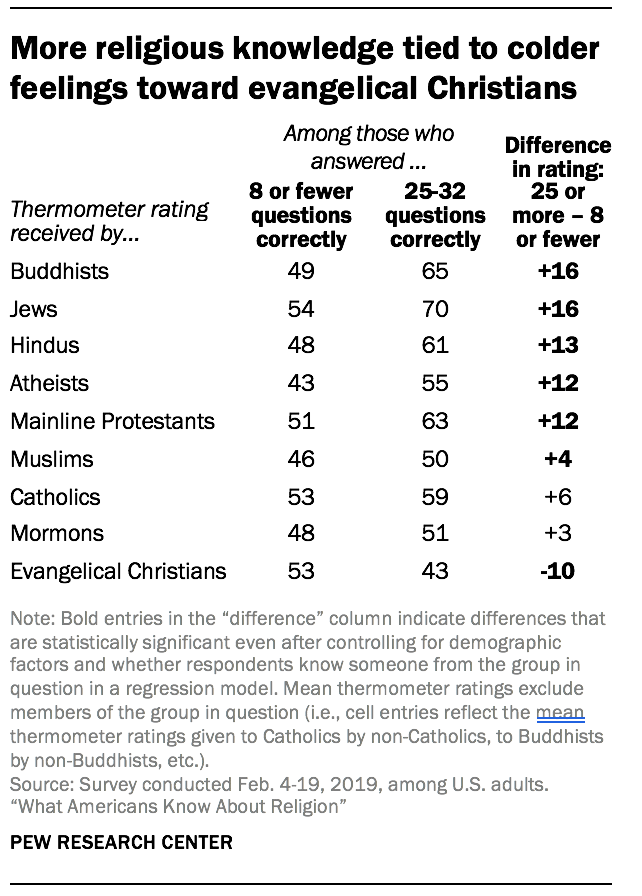The better Americans know evangelical Christians, the less they like them, according to a recent study from the Pew Research Center.
The wide-ranging What Americans Know About Religion study found that, in general, people who are more familiar with a religion other than their own tend to express more favorable views toward members of that faith.
People who are not atheists themselves but personally know someone who is, for example, rate atheists more warmly than people who do not know an atheist.
 The survey also found that those who know the most about the teachings of a religion other than their own are more likely to rate adherents to that faith more favorably.
The survey also found that those who know the most about the teachings of a religion other than their own are more likely to rate adherents to that faith more favorably.
People who correctly answer the most questions about religious knowledge hold warmer feelings toward Buddhists, Hindus, mainline Protestants, atheists and Muslims than those who know little about faiths other than their own.
“One notable exception to this pattern is evangelical Christians,” the study said.
“One exception to this pattern is evangelical Christians, who are rated most warmly by those at the low end of the religious knowledge scale,” the study said.
Asked to rate groups on a “feeling thermometer” ranging from zero (coldest and most negative) to 100 (warmest and most positive), respondents who could answer at least 25 of 32 questions designed to measure the public’s knowledge about religion in general gave evangelicals an average temperature of 43 degrees. Those who correctly answered eight or less viewed evangelicals more warmly, at 53 degrees.
Overall Americans rate Jews (63), Catholics and mainline Protestants (both 60) at the warmer end of the feelings scale and Mormons (51) , atheists and Muslims (both 49) at the cooler end. Buddhists (57), evangelical Christians (56) and Hindus (55) rate in between.
Thermometer ratings reported for evangelical Christians exclude ratings given by evangelical Protestants. Protestant respondents were categorized as “evangelical” or “mainline” based primarily on the specific denomination with which they identify.
Southern Baptist respondents were categorized as evangelical, for example, while United Methodist respondents were categorized as mainline.
The religious knowledge section consisted of 32 questions in total, including 14 about the Bible and Christianity, 13 about other world religions (four about Judaism, three about the religious composition of particular countries, two each about Islam and Hinduism, and one each about Buddhism and Sikhism), two about atheism and agnosticism, two about the size of religious minorities in the U.S. adult population, and one about religion in the U.S. Constitution.
The survey found that 29 percent of adults overestimate the size of the U.S. Jewish or Muslim populations, guessing that one or both groups make up more than 5 percent of the total population.
Earlier research estimates that followers of Judaism make up about 1.8 percent of the U.S. population and Muslims about 1.1 percent.
Just one American in four (27 percent) knows the Constitution specifies that “no religious test” can be required to hold public office and 12 percent erroneously believe the Constitution requires federal officeholders to be sworn in on the Holy Bible.
